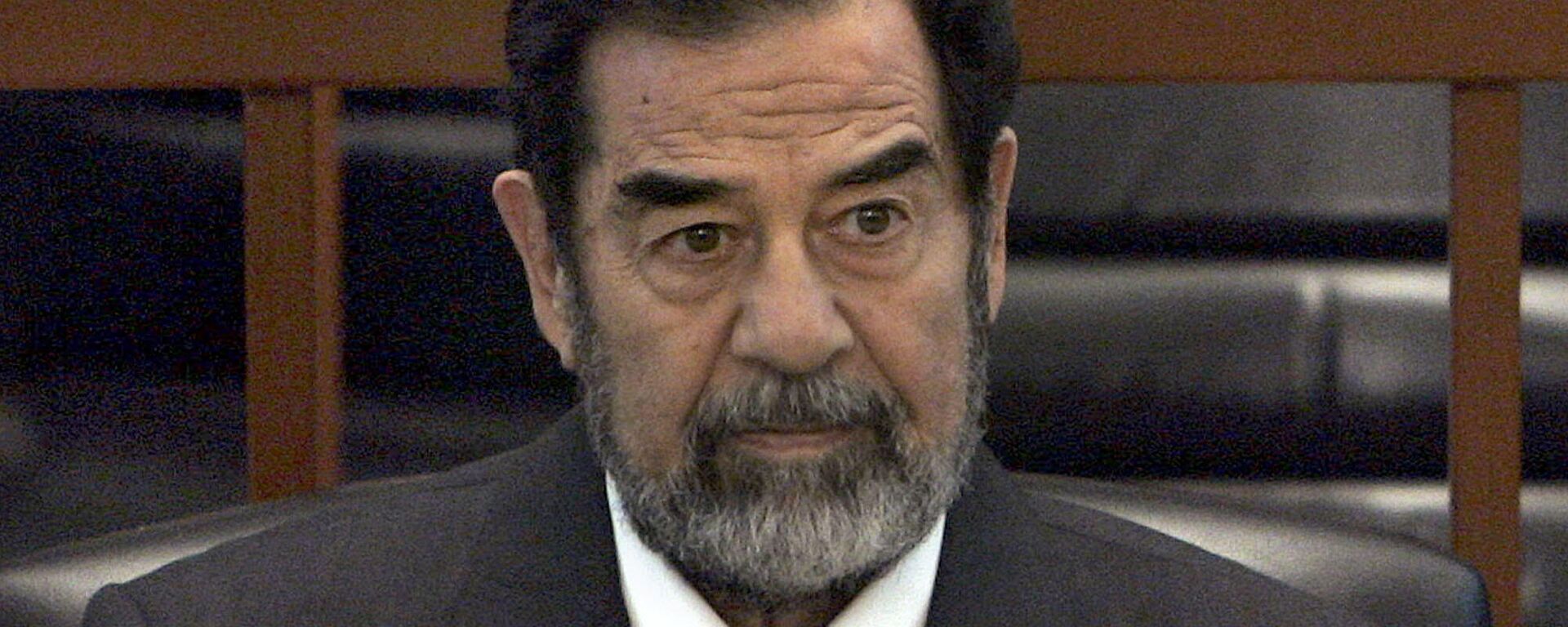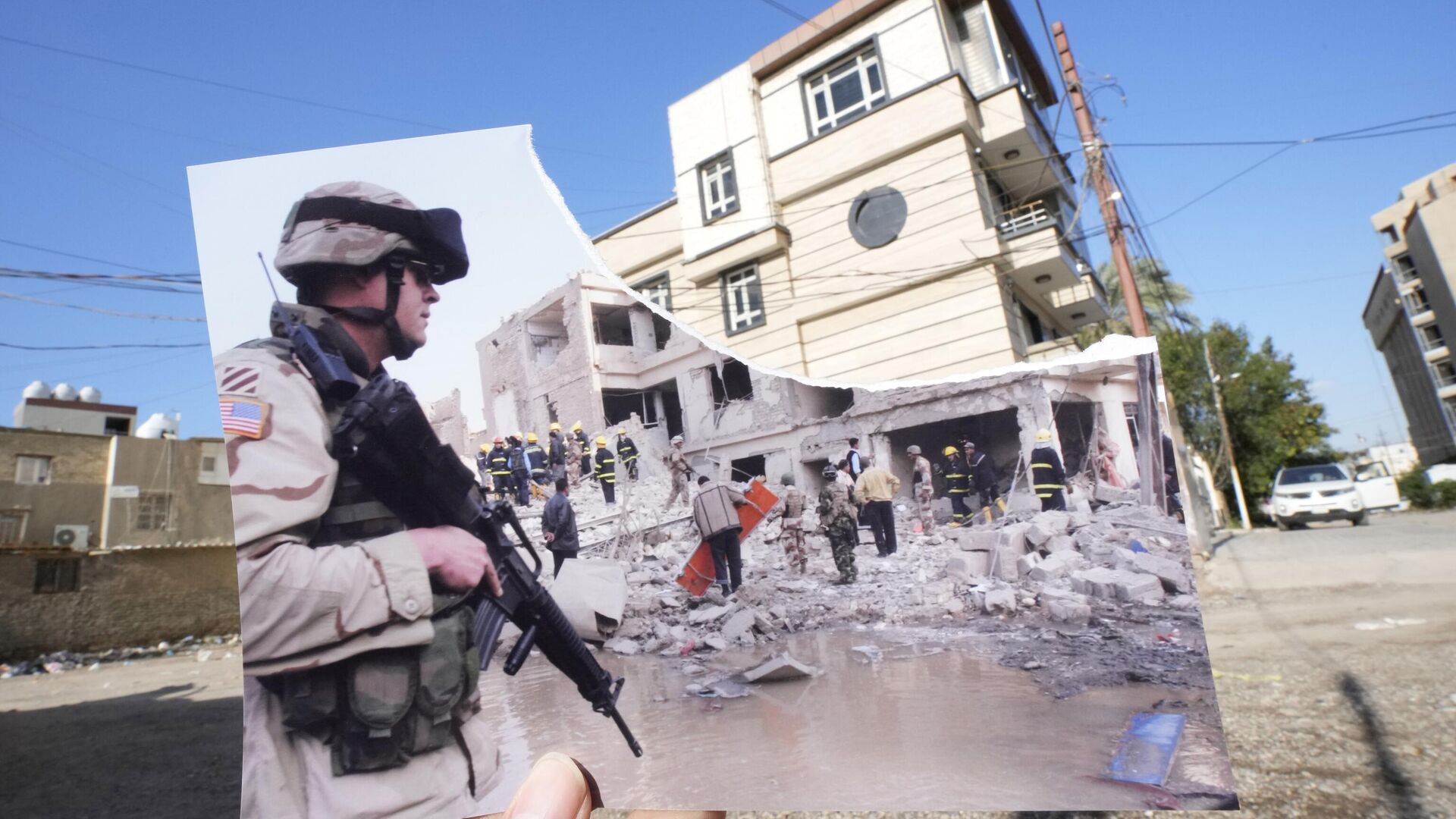https://sputnikglobe.com/20240127/insanity-on-steroids-ex-us-official-describes-israel-neocon-nexus-driving-foreign-policy-1116423242.html
‘Insanity on Steroids’: Ex-US Official Describes Israel-Neocon Nexus Driving Foreign Policy
‘Insanity on Steroids’: Ex-US Official Describes Israel-Neocon Nexus Driving Foreign Policy
Sputnik International
As reports emerged of US discussions to withdraw troops from Iraq, author and defense expert Michael Maloof joined Sputnik’s The Final Countdown program Friday to recount the United States’ controversial decision to intervene in the country in 2003.
2024-01-27T01:37+0000
2024-01-27T01:37+0000
2024-01-27T04:40+0000
analysis
us
iraq
cia
israel
syria
iraq war
us invasion
us hegemony
us interventions
https://cdn1.img.sputnikglobe.com/img/07e7/04/13/1109655552_0:160:3072:1888_1920x0_80_0_0_9c9af3cf62b21b7a780421ec0f769bc7.jpg
As reports emerged of US discussions to withdraw troops from Iraq, author and defense expert Michael Maloof joined Sputnik’s The Final Countdown program Friday to recount the United States’ controversial decision to intervene in the country in 2003.“All of a sudden [the] CIA in October of 2002 comes out with this NIE, or National Intelligence Estimate, saying, 'Oh, they've got WMD,'” recalled Maloof. “Well, we all sort of pinched ourselves and said, 'No, they don't. We don't have that evidence.'”Maloof said he was contacted by officials from Syria and Lebanon worried about the destabilizing effects regime change in Iraq would have on the greater region. The analyst worked to express his grave concerns to peers at the Defense Department, insisting the claims of weapons of mass destruction and Iraqi President Saddam Hussein’s support for terrorism were unfounded.But he eventually came to understand that high US officials had other reasons for supporting the invasion.“We were looking at the Middle East completely through the prism of Israel, and we still do. And look where it's gotten us.”Observers have long noted the overlap between ideological Zionists, who prioritize defense of Israel, and neoconservatives, who support a muscular and interventionist US foreign policy. Wolfowitz was a strong Zionist as was Bill Kristol, a prominent supporter of the Iraq War who’s often considered the leader of the modern neoconservative movement in the United States.Current US Secretary of State Antony Blinken argued on behalf of Israel during his time as a student at Harvard University, and US President Joe Biden has repeatedly proclaimed he is a “Zionist” even though he’s of non-Jewish heritage.Although some believed the invasion of Iraq would be in Israel’s interest, Maloof argued the destabilizing legacy of the intervention has imperiled the entire region.“This was a disaster ready to happen and it's now occurred,” added Maloof. “And we're just digging a deeper, deeper hole, wondering why we can't get out of it. But, it's insanity on steroids. And so, and as a consequence of my actions, I got ostracized. And ultimately, I was forced to leave.”Maloof said a similar mindset was responsible for US intervention in the Syrian Civil War, which has given rise to the CIA’s $1 billion Timber Sycamore program, one of the most expensive covert efforts in the agency’s history.
https://sputnikglobe.com/20221230/how-saddam-husseins-execution-scarred-iraq-and-changed-us-foreign-policy-forever-1105930776.html
https://sputnikglobe.com/20231121/ex-cia-analyst-us-responsible-for-gaza-genocide-by-empowering-netanyahu--1115100230.html
https://sputnikglobe.com/20230315/twelfth-anniversary-of-war-how-syria-upended-wests-plans-to-nix-statehood-and-isolate-damascus-1108434106.html
iraq
israel
syria
Sputnik International
feedback@sputniknews.com
+74956456601
MIA „Rossiya Segodnya“
2024
John Miles
https://cdn1.img.sputnikglobe.com/img/07e8/01/19/1116388787_0:0:1316:1316_100x100_80_0_0_77e70d36afd983012b1c5d38ddb84156.jpg
John Miles
https://cdn1.img.sputnikglobe.com/img/07e8/01/19/1116388787_0:0:1316:1316_100x100_80_0_0_77e70d36afd983012b1c5d38ddb84156.jpg
News
en_EN
Sputnik International
feedback@sputniknews.com
+74956456601
MIA „Rossiya Segodnya“
Sputnik International
feedback@sputniknews.com
+74956456601
MIA „Rossiya Segodnya“
John Miles
https://cdn1.img.sputnikglobe.com/img/07e8/01/19/1116388787_0:0:1316:1316_100x100_80_0_0_77e70d36afd983012b1c5d38ddb84156.jpg
us interventions, us hegemony, us military operation, us-led terrorism, american terrorists, terrorist state, us hegemony, pro-american terrorists, us-iraq war, us-syria war, color revolutions, arab spring, proamerican terrorists, good terrorists, funding of terrorists, funding of terrorism, money for terrorists, american money for terrorists, american-backed terrorists, american-backed terrorism, us-backed terrorists, us-backed terrorism
us interventions, us hegemony, us military operation, us-led terrorism, american terrorists, terrorist state, us hegemony, pro-american terrorists, us-iraq war, us-syria war, color revolutions, arab spring, proamerican terrorists, good terrorists, funding of terrorists, funding of terrorism, money for terrorists, american money for terrorists, american-backed terrorists, american-backed terrorism, us-backed terrorists, us-backed terrorism
‘Insanity on Steroids’: Ex-US Official Describes Israel-Neocon Nexus Driving Foreign Policy
01:37 GMT 27.01.2024 (Updated: 04:40 GMT 27.01.2024) A former analyst at the Department of Defense recalls the United States’ disastrous decision to invade Iraq in 2003.
As
reports emerged of US discussions to withdraw troops from Iraq, author and defense expert Michael Maloof joined
Sputnik’s The Final Countdown program Friday to recount the United States’ controversial decision to intervene in the country in 2003.
“I was in the Pentagon at the time, and I was intricately involved in that whole fiasco of whether or not we should invade Iraq,” said the former senior security policy analyst in the office of the US Secretary of Defense. “I was one of the very few who was sending memos up to [former Defense Secretary Paul] Wolfowitz's office – who was then deputy secretary – saying, 'We don't have that evidence of WMD [weapons of mass destruction], contrary to what CIA is saying, because we monitored Iraq for years through export controls and what have you.”
“All of a sudden [the] CIA in October of 2002 comes out with this NIE, or National Intelligence Estimate, saying, 'Oh, they've got WMD,'” recalled Maloof. “Well, we all sort of pinched ourselves and said, 'No, they don't. We don't have that evidence.'”

30 December 2022, 16:50 GMT
Maloof said he was contacted by officials from Syria and Lebanon worried about the destabilizing effects regime change in Iraq would have on the greater region. The analyst worked to express his grave concerns to peers at the Defense Department, insisting the claims of weapons of mass destruction and Iraqi President Saddam Hussein’s support for terrorism were unfounded.
But he eventually came to understand that high US officials had other reasons for supporting the invasion.
“What I learned later is that Wolfowitz, even before he became Deputy Secretary of Defense, had advocated when he was at Johns Hopkins [University] for the overthrow of Saddam Hussein,” Maloof explained. “Why? Because they were enemies at that time of Israel.”
“We were looking at the Middle East completely through the prism of Israel, and we still do. And look where it's gotten us.”
Observers have long noted the overlap between ideological Zionists, who prioritize defense of Israel, and neoconservatives, who support a muscular and interventionist US foreign policy. Wolfowitz was a strong Zionist as was Bill Kristol, a prominent supporter of the Iraq War who’s often considered the leader of the modern neoconservative movement in the United States.
Current US Secretary of State Antony Blinken
argued on behalf of Israel during his time as a student at Harvard University, and US President Joe Biden has repeatedly
proclaimed he is a “Zionist” even though he’s of non-Jewish heritage.

21 November 2023, 19:19 GMT
Although some believed the invasion of Iraq would be in Israel’s interest, Maloof argued the destabilizing legacy of the intervention has imperiled the entire region.
“This still haunts me to this day because there were some of us who were really concerned about what this would lead to,” said the analyst. “We at the time suggested that such a war [and] the fall of Saddam Hussein would actually create a political vacuum in that region and then allow the Iranians to gain greater influence, which they were vying for at that time.” Iran is an outspoken opponent in the Middle East of Israel’s treatment of the Palestinians.
“This was a disaster ready to happen and it's now occurred,” added Maloof. “And we're just digging a deeper, deeper hole, wondering why we can't get out of it. But, it's insanity on steroids. And so, and as a consequence of my actions, I got ostracized. And ultimately, I was forced to leave.”
Maloof said a similar mindset was responsible for US intervention in the Syrian Civil War, which has given rise to the CIA’s $1 billion Timber Sycamore program, one of the most expensive covert efforts in the agency’s history.
“When we went into Iraq in 2003 the whole plan was that would be the hub, the US hub from which the United States would then work on regime change in Syria, Iran then Saudi Arabia and Libya because they were all opposed to Israel,” said the expert. “And that's why we built the largest embassy in the world in Baghdad at the time that was virtually vacant.”






